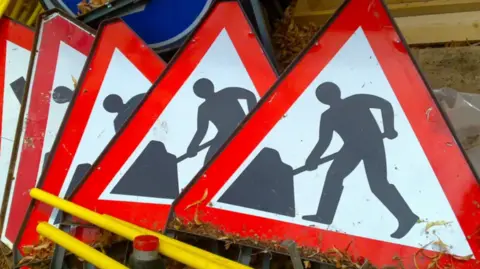Councils 'need new powers over street works'
 Getty Images
Getty ImagesLocal authorities should be given new powers to limit the disruption caused by street works undertaken by utility companies, a group of MPs has said.
A report published on Wednesday by the Transport Committee makes a number of suggestions after hearing that councils felt ill-equipped to manage works.
These include tighter controls on the use of "immediate" or "urgent" permits, and allowing all local highway authorities adopt "lane rental schemes" which would charge utility companies for each day that works are carried out.
Kent County Council's (KCC) cabinet member for highways and transport Bill Barrett said they "welcome the report", after road closure permits hit a record high in 2023/24.
"We are pleased to have the chance to share the frustrations of Kent's residents and businesses about the increasing number of unplanned utility roadworks," Mr Barrett added.
The committee's recommendations, especially tougher rules on immediate permits and longer guarantees on roadwork, "would help the county council to better protect Kent's roads and keep Kent moving", he said.
"We now urge the government to act on these proposals," he added.
Ruth Cadbury from the Transport Committee said: "Street works can feel like a recurring nightmare.
"The complaints are all too familiar: temporary traffic lights appearing overnight on a road that was already dug up a few months ago, sites left unattended on weekends, works overrunning, lorries diverted down roads too small for them, and disabled people often unable to negotiate their way around the site safely."
The committee said permits allowing companies to dig up roads at short notice should only be used in emergency situations.
Increasing repair costs
Given the difficulties in monitoring this, it has recommended that the Department for Transport (DfT) consult on a new definition that prevents the use of these permits in non-emergency situations.
While some local authorities are permitted to charge up to £2,500 per day while street works are carried out, the committee argues that the DfT should let more councils set up their own lane rental schemes without the need for government approval.
Chief executive of utilities representative body Street Works UK, Clive Bairsto, saif this will "lead to the development of inconsistent schemes which will not be in the best interests of the utility bill-payers".
Utility companies are currently responsible for the quality of the road surfaces they have reinstated for two years after street works have completed, or for three years for deeper excavations.
The committee recommends this period be extended to five years. Any cracks that appear after two years are currently repaired using taxpayers' money.
Mr Bairsto says that this extension "will certainly drive up the cost of utility works" if implemented.
Street Works UK members are concerned the arguments put forward against the extension "have not been properly reflected", he added.
A DfT spokesperson said: "We wholeheartedly agree that street works are far too disruptive for drivers and that is why we have taken action to prevent the impact on drivers."
They added the department "will put measures in place so 50% of surplus lane rental funds must be invested into highway maintenance".
Follow BBC Kent on Facebook, on X, and on Instagram. Send your story ideas to [email protected] or WhatsApp us on 08081 002250.
